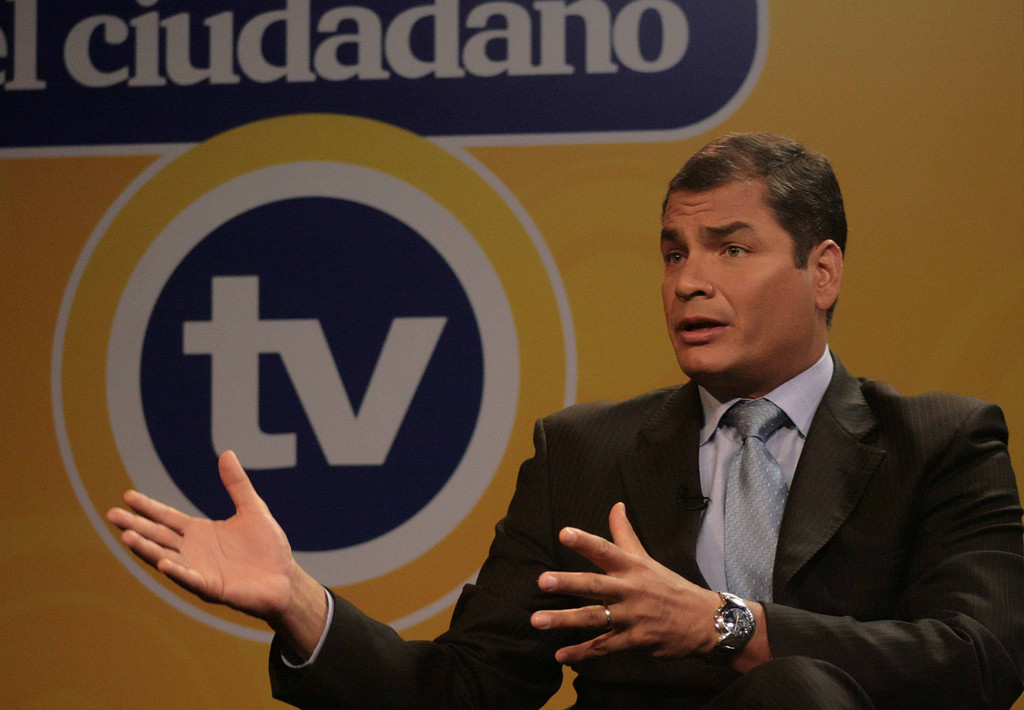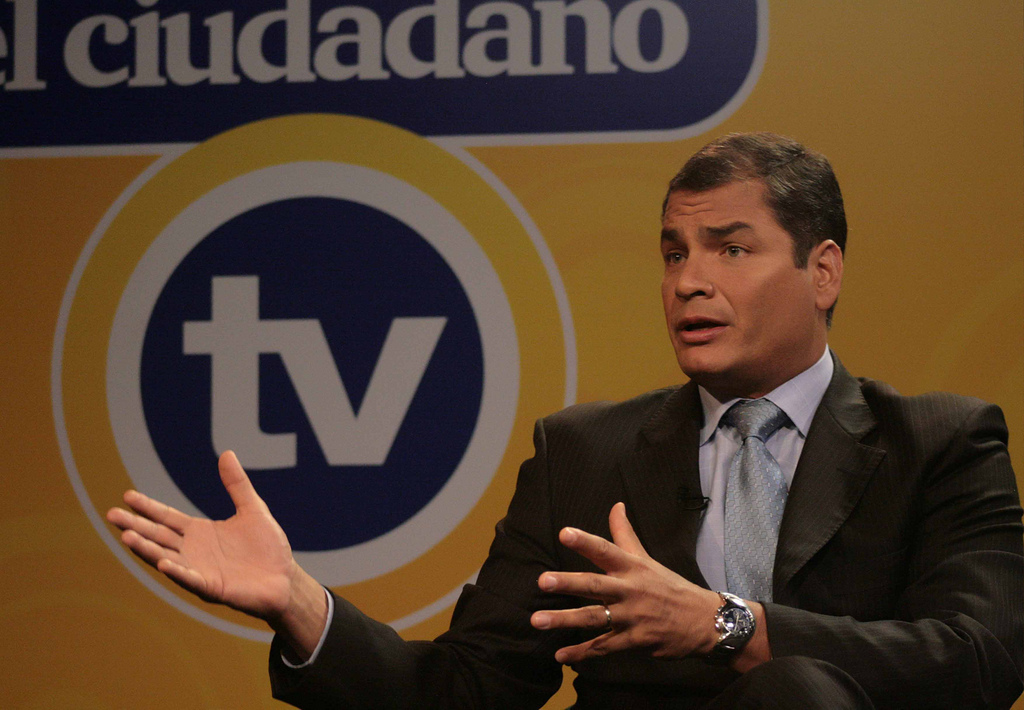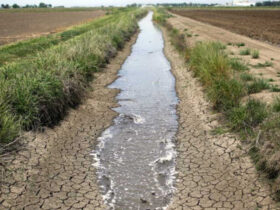
John Oliver, burning tires and flowers. Why do these three seemingly disparate entities belong in the same list? They each indicate just how dangerous Ecuadorian President Rafael Correa is and could become.
Correa’s eight-year reign, now in its third term, has brought significant benefits to the people of Ecuador, including an impressive drop in the poverty rate from 37% in 2007 to 22% in 2014 and stability to a nation that in the prior decade saw seven presidents removed from office before completing their terms. But an alarming combination of hypersensitivity to criticism, obsession with power at any cost and a faltering economy could push Correa to civil war with his people—or worse, trap them in an oppressive, smothering dictatorship.
The President’s hypersensitivity manifests itself in Ecuador’s poor record on freedoms of expression and the press. Freedom House has labeled Ecuador “Not Free” in its Freedom of the Press category for 2015, citing strict censorship laws passed by the Correa regime, specifically a 2013 law, The Organic Law on Communications, that allows more government regulation of the media by dictating the types of information that can and cannot be presented and expanding governmental monitoring capabilities.
Moreover, Human Rights Watch has noted several cases that used the Digital Millennium Copyright Act, a US law that requires websites to remove content on the grounds of copyright infringement without ever going through the judiciary. President Correa, according to Human Rights Watch, has used this precedent to compel global social media sites to remove content that is critical of his administration. The cases were all brought by a Spanish firm representing media entities linked to the regime, including the public TV station, the political party and even a government ministry.
But, then again, grotesque media censorship is not all that surprising coming from a man who angrily tweeted John Oliver for condemning his underwhelming record with regard to freedom of the press.
Troublingly, Correa’s penchant for stifling free and fair journalism by any means necessary – including calling one female journalist a “fatty” in order to discredit her – is not his worst leadership quality. In addition to his distaste for media criticism, he often responds to protests against his policies with state-sanctioned cruelty.
During August 2015, a national strike was called to protest controversial inheritance tax policies, the expansion of oil drilling and mining, changes to labor laws and pensions, repression of the freedoms of speech and the press, and constitutional amendments (discussed later). In response to the demonstrations, reports state that the Ecuadorian police used tear gas and clubs on protestors, arrested and searched citizens arbitrarily, declared a warrantless “State of Exception,” and even targeted female protestors’ “intimate regions” during attacks—all while Correa publically praised the police.
Police violence and excessive use of power are not new to the Correa regime. In 2010, after a demonstration during which members of the air force and police department blockaded major thoroughfares with burning tires to protest cuts in benefits, the President responded by publically declaring that “no pardon or forgiveness” would be given to those involved. Correa even stated that he would attack members of the opposition political party, who he accused of attempting to stage a coup.
His sensitivity and violent streak depict a man with a need to hoard power, an image only enhanced when examining the aforementioned constitutional reforms. If adopted, Correa’s proposed amendments to the Ecuadorian constitution would eliminate term limits for public officials. These amendments would, in theory, allow him legislative freedom to rule for life should he continue to win elections, and are being advertised by the ruling party despite a 14-point drop in the President’s approval rating, an overall disapproval rating of 55% and 50% of Ecuadorians saying they no longer trust him.
The most immediate threat to Correa’s coveted power might not come from the people of Ecuador, but rather its economy. As oil prices have fallen and the dollar – Ecuador’s currency since 2000 – has strengthened, Ecuador’s economic activity has stalled; public coffers are beginning to dry up and Correa has lost a valuable leverage over his people. As a commodity exporting country – its two major exports being oil and bananas – volatile commodity markets affect Ecuador disproportionally.
Concurrently, the sanctions placed on Russia in response to President Putin’s aggression against Ukraine have also gravely affected Ecuadorian cut flower exports. The flower industry in Ecuador employed over 100,000 people and generated $873 million in business in 2013, with Russia as one of its principal buyers. As such, imposed sanctions have hurt the Ecuadorian flower industry. Ecuadorian industry is losing competitiveness across the board and it is unable to devalue its currency in order to spur export competitiveness.
Correa also poses an economic threat to foreign markets. He came to power in 2008 by defying the international monetary community and defaulting on his country’s debt. His economic legacy is volatile at best, and, with access to total power, he could initiate a crackdown on foreign investment in the form of creeping expropriation—investment that totaled over $725 million in 2013 and reached an eight-year high with over a billion dollars invested in 2008. The US State Department has labeled Ecuador fairly open to FDI in the past, indicating any attempt by Correa to close off foreign economic involvement could affect the significant international presence in the national economy. Moreover, because Ecuador has adopted the dollar, the American Federal Reserve Bank has control of Ecuador’s currency; the American government should have vested interest in the stability of democracy and free trade there.
The Twitter war with John Oliver proves that Rafael Correa will do anything in his power to discredit and silence his critics. How he handled the burning tire protest and others since then prove that he will publically call for and subsequently condone the use of force in response to demonstrations against his policies, stifling dissent. Most importantly, the issues with commodity exports demonstrate the fragility of Ecuador’s economy, the performance of which was Correa’s one legitimate claim to the popularity and adulation he so clearly covets. His disapproval and distrust numbers keep climbing while simultaneously he and his party are increasing attempts to codify in Constitutional law his indefinite right to the Presidency. If he continues losing popularity, the situation will worsen.
For the sake of the people of Ecuador and foreign investment in the country, vigilance is necessary, lest Correa forcefully construct an oppressive, leftist state. He may be “one of Latin America’s most popular leaders” today, but Rafael Correa is a ticking time bomb set to go off in the near future with clear potential for disaster.
The views expressed by the author do not necessarily reflect those of the Glimpse from the Globe staff, editors or governors.







